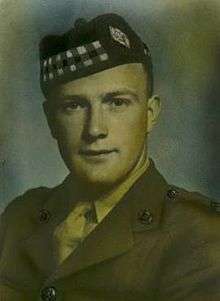Douglas Ford (British Army officer)
Captain Douglas Ford GC (1918–1943) was a Royal Scots officer and British prisoner of war in the Second World War, who was posthumously awarded the George Cross for conspicuous gallantry.[1] His citation was published in the London Gazette on 18 March 1946.
Douglas Ford GC | |
|---|---|
 | |
| Born | 18 September 1918 Galashiels, Scotland |
| Died | 18 December 1943 (aged 25) Sham Shui Prison Camp, Japanese-occupied Hong Kong |
| Buried | Stanley Military Cemetery, Hong Kong |
| Allegiance | |
| Service/ | |
| Years of service | 1939–1943 |
| Rank | Captain |
| Unit | Royal Scots |
| Battles/wars | World War II
|
| Awards | |
Early life
Ford was born in Galashiels in September 1918. He was a son of Mrs and Mrr Douglas Ford, of 25 Bryce Avenue, Portobello. He was educated at the Royal High School,[2] Edinburgh. A keen sportsman, excelling in rugby and cricket, he rose to school captain in 1936. He was 20, and on part-time studies at the University of Edinburgh for chartered accountancy, when he joined the Royal Scots at the outbreak of war. A member of the University OTC, he was commissioned, and posted to Hong Kong. His brother, James Allan Ford, was also a captain in the Royal Scots. This was the first time that two brothers in the regiment had served together in Hong Kong.[3]
Second World War
Ford was still serving in the 2nd Battalion, Royal Scots, when he and his brother were taken prisoner by the invading Japanese upon the fall of Hong Kong in December 1941. During his captivity at Sham Shui Po POW camp he made contact with British agents and planned, in conjunction with other officers, a major break out. Before the plans could be put into operation the Japanese grew suspicious and interrogated him and others they suspected of involvement. Despite torture in Stanley Prison, starvation and a sentence of death he refused to betray his comrades. After being forced to dig his own grave,[4] he was executed by Japanese firing squad, at Sham Shui on 18 December 1943, with two fellow prisoners, Colonel Lanceray Arthur Newnham, MC, the Middlesex Regiment, and Flight Lieutenant Hector Bertram Gray, Royal Air Force. He is buried in Stanley Prison cemetery.
The citation noted:
Captain Ford was interrogated, tortured, starved, and finally met his death with Colonel Newnham. Throughout his terrible ordeal, the behaviour of Captain Ford was superb. He refused to implicate any others. He maintained his spirits and those of his fellow prisoners until the end. His self-control, superb heroism, and self-sacrifice in face of the most brutal torture cannot have been surpassed.
King George VI approved the award '"in recognition of the most conspicuous gallantry in carrying out hazardous work in a very brave manner".[5]
Captain Ford is buried in Stanley Military Cemetery, Hong Kong, grave reference 1.B.41.[6][7]
His brother, James Allan Ford, survived the war and later wrote a novel based on the life and death of Douglas Ford, Season of Escape, which was awarded the Frederick Niven Award.[8]
References
- https://web.archive.org/web/20071231042233/http://www.theroyalscots.co.uk/honsawards.html. Archived from the original on 31 December 2007. Retrieved 19 November 2007. Missing or empty
|title=(help) - "A tale of Valour". Royalhigh.co.uk. Retrieved 26 February 2016.
- 'Bravery in Prison Camps. Posthumous George Cross Awards. An Edinburgh Officer', Scotsman (19 April 1946), p. 4.
- "A tale of Valour". Royalhigh.co.uk. Retrieved 26 February 2016.
- 'Bravery in Prison Camps', op. cit.
- "GC Awards to Jap POWs". Stephen-stratford.com. Retrieved 26 February 2016.
- "Casualty Details". CWGC.org. Retrieved 26 February 2016.
- "Capital novelist James Allan Ford was a man of many talents". The Scotsman. 30 April 2009.